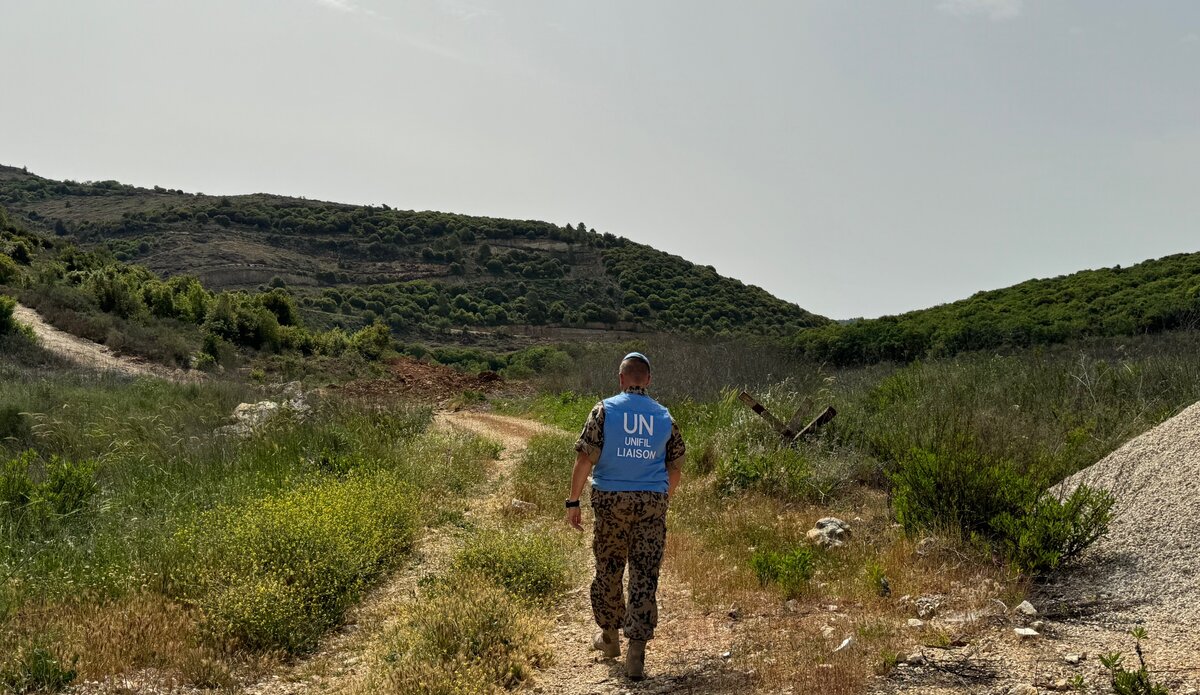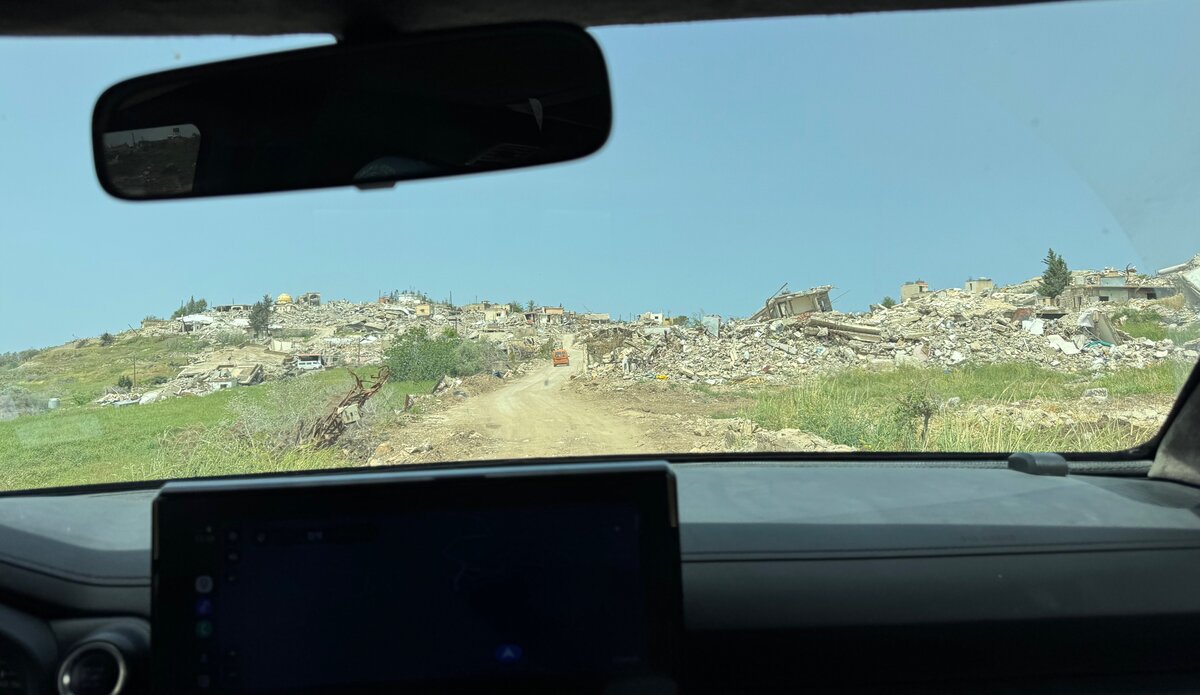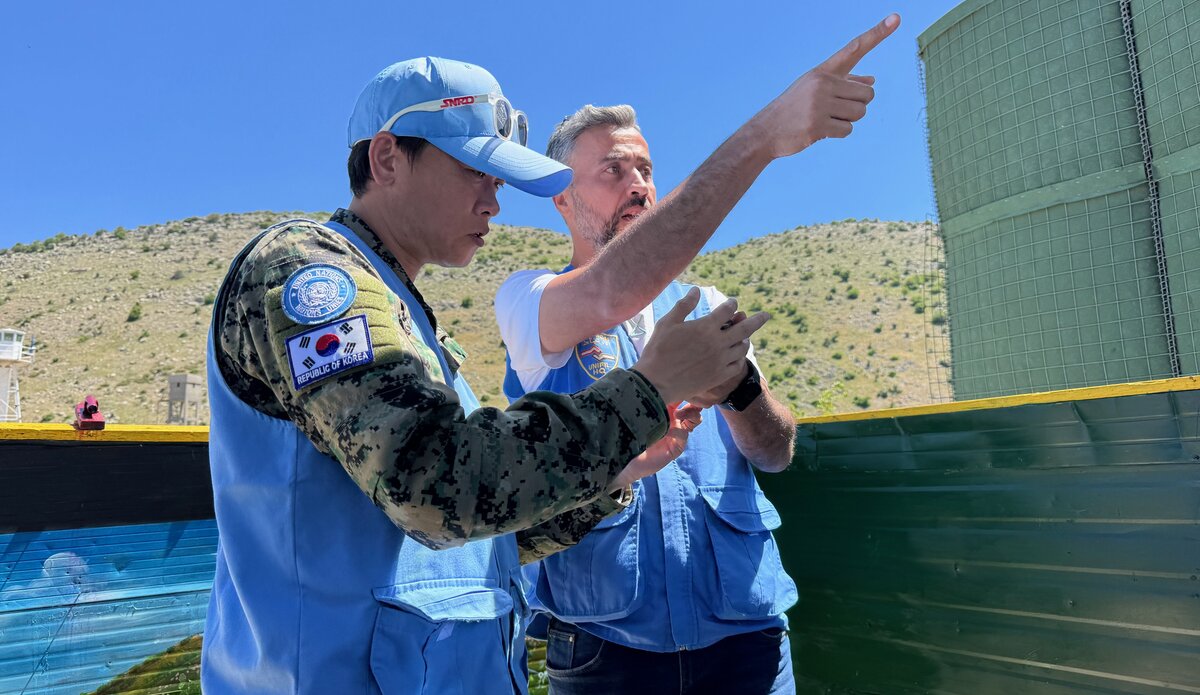Evolving role of UNIFIL’s Liaison Branch
The role of UNIFIL’s Liaison Branch grew steadily and significantly as the exchanges of fire across the Blue Line intensified since October 2023. Whether serving as a critical conduit between the Lebanese Armed Forces (LAF) and the Israel Defense Forces (IDF), or facilitating humanitarian activities and emergency operations in southern Lebanon, this UNIFIL unit has remained indispensable over the past 20 months.
As the only UNIFIL unit having permanent physical presence on both sides of the Blue Line, the UNIFIL Liaison Branch conducts daily patrols to impartially monitor and report ongoing activities and developments on the ground. However, such activities were on hold at the height of the recent hostilities with regular patrols resuming in January 2025.
Prior to October 2023, its primary focus was to mitigate tensions along the Blue Line. At the height of hostilities, its role evolved to include the rapid dissemination of accurate information to the parties, facilitating rescue operations, preventing casualties, and maintaining open channel of communication between them. Following the cessation of hostilities (CoH) understanding of 27 November 2024, it played a key coordinating role in the withdrawal of IDF forces and the subsequent redeployment of LAF units to more than 120 positions in the south.
Ongoing Liaison patrols concentrate on areas of friction and heightened tension.
One recent patrol – comprising two vehicles, four UNIFIL liaison officers, and two support staff – crisscrossed wadis and southern Lebanese villages devastated by the recent hostilities.
The patrol leader, Major Seppo from Finland, who prefers to go by one name, said the day’s mission was to identify any new developments on the ground, such as military movements or new infrastructure. During the patrol, just minutes apart, the team passed through the utter devastation in Ayta ash-Shaab and then through the town of Rmeish, which remained largely intact.
A few kilometres from Rmeich, and after passing through vast tobacco fields, the patrol reached UNIFIL Temporary Position 16 (TP16), which has been vacated since October 2023, right along the Blue Line.
Behind this Position is an open field disputed by both Israel and Lebanon – considered one of the 13 “reservation areas” along the Blue Line. Major Seppo and his fellow liaison officer Major Hassan Kamara from Sierra Leone noticed something unusual: while the field was largely untouched with growing bush two weeks earlier, a significant portion had now been bulldozed.
“Today, surprisingly, I am seeing behind TP16 point that the bush has been cleared by the IDF,” said Major Kamara, adding that the area had been covered with bush just two weeks earlier.
Another change the patrol noticed was the installation of a T-wall a few hundred metres south from the open field – on the Israeli side.
Major Seppo said the T-wall was observed for the first time.
The patrol then drove up a rough track to reach a LAF position east of the village of Yaroun. On the way up, they noted IDF construction work south of the Blue Line. The LAF position, surrounded by a T-wall, is one of over 120 positions handed over to the LAF with UNIFIL’s support following the IDF’s withdrawal in late January 2025.
The patrol set out on its return journey to their base in Naqoura after visiting some LAF positions, and the team again passed through scenes of devastation, especially in the erstwhile bustling towns of Yaroun and Maroun ar-Ra’s.
New actors, new role
UNIFIL’s Chief Liaison Officer Colonel Olivier Waché says the role of Liaison Branch has evolved “quite a lot” since the cessation of hostilities (CoH) understanding of 27 November 2024, especially due to the arrival of “new actors.”
“The first one being the (US-led) Mechanism (to monitor implementation of the CoH understanding) and because of the fact that there is a new environment with the occupation of five areas by the Israel Defense Forces and the fact that there are no non-state actors conducting military operation anymore,” said Col. Waché. “So, for us, the role evolves in the way that we are now more concentrated on the ground.”
He said the daily patrols help understand if there are frictions between the LAF and the IDF.
“And in this way, we are going to be in between, and going between the different forces to explain what’s going on from one side and… to explain what the constraints are, the expectations of both of them are,” he added. “In this way, we are the ones who are typically conducting mitigation on the ground.”
One of the new tasks the Liaison Branch did since last November was to facilitate the safe return of Lebanese citizens released from Israeli detention. “We are the ones who are linking between the Lebanese Armed Forces, the Lebanese Intelligence, the IDF, the International Red Cross and the Lebanese Red Cross. So, we are the go-between for all these organizations and parties.”
Historical context
In one of tripartite meetings – chaired by UNIFIL and attended by representatives of both LAF and IDF – in December 2006, all the sides agreed to establish a liaison and coordination arrangement. The aim was to establish a mechanism to ensure a more effective implementation of relevant military and security provisions of Security Council Resolution 1701 in order to prevent the resumption of hostilities.
The decision subsequently led to the creation of the UNIFIL Liaison Branch with corresponding arrangements with both parties: the deployment of UNIFIL liaison officers (LOs) in IDF Northern Command and the deployment of LAF liaison officers in UNIFIL Joint Operation Centre, for the purpose of liaising with respective military headquarters.
Prior to October 2023, there were six teams deployed along the Blue Line: four on the Lebanese side and two in Israel. In addition, there was a Quick Reaction Team with the capability of deploying when and where a need arises.
Among UNIFIL’s 29 liaison officers from 21 countries currently, a team of two officers are in the Israeli side. Those deployed south of the Blue Line used to conduct patrols close to the Line everyday. While patrols on the Israeli side haven’t resumed yet, daily patrols on the Lebanese side never totally stopped but effectively resumed in January 2025.
 UN
UN United Nations Peacekeeping
United Nations Peacekeeping











